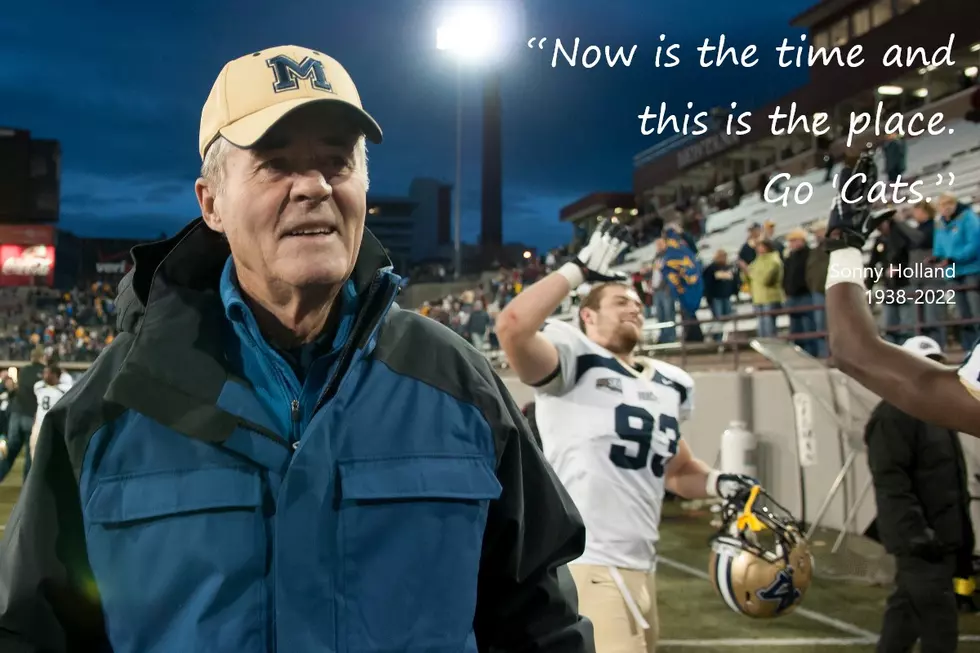
Legendary MSU Coach Sonny Holland Dies at 84
BOZEMAN – Usually, the retirement of an athlete’s jersey number is reserved for later in their life or even after death. For Sonny Holland, that honor was bestowed upon number 52 immediately after his final game as a Bobcat in 1959, when Holland was 22 years old. Those around him knew early that Holland would go down in Montana State University history.
Allyn “Sonny” Holland, dubbed the Greatest Bobcat of All Time by fans and the Bozeman community, died on Dec. 3. He was 84 years old.
Born in Butte on March 22, 1938, Holland is remembered for having embodied a characteristic Montana toughness and work ethic through his football career. But there was also a humility to his leadership as both player and coach.
“Coach Holland was more of a father than a coach to the players at Montana State during the 70s,” said Rick Vancleeve, a lineman on the 1976 national champion Bobcat football team under Holland. “He was a soft, gentle man that demanded respect without ever demanding anything. His manner was to let you know what the right thing to do was, but let you make the choice on what you were to do. His leadership style made us champions on and off the field.”
Montana State’s first ever three-time All-American football player made an impact on the football field from his first game, joining the starting lineup in 1956 and rolling with that team straight to MSU’s first national title. Holland played center and linebacker, positions that require precise instincts and impeccable control — as well as an immense amount of hard work, something Holland embraced.
“Coach Holland’s primary goal was to win the Big Sky, beat the Grizzles, develop his players to grow up and become men, get a great education, represent MSU with pride and always do the right thing,” said Delmar Jones, a running back on that 1976 championship team. “In my view, he exceeded these goals and more. Every major decision I make in life I ask myself…what would Coach Holland do?”
During Holland’s time as a player, the Bobcats boasted a stellar record of 31-6-1, though they wouldn’t win their second national championship for another 20 years. Holland would be integral to that title as well, but, first, a career in coaching would take him across Montana and beyond.
Holland began coaching almost immediately after his graduation from MSU, becoming an assistant coach at Bozeman High School in 1961. He joined the Bobcat coaching staff for the first time the following year, serving as an offensive line coach until 1965. He left Montana briefly in 1968 to coach at Washington State University, only to return in 1969 to coach Western Montana College (now the University of Montana Western in Dillon) to a perfect 7-0 season and Frontier Coach of the Year honors.
But in 1970, Holland returned to his beloved Montana State, where the athletes he coached called him simply “Coach” or “Chief.” After a year as defensive line coach, he ascended to head coach when another Bobcat legend, Tom Parac, became athletic director. After a lukewarm start in 1971 with a 2-7-1 record, the Bobcats would win their first conference title under Holland's leadership in 1972, played at Bozeman High School's Van Winkle Stadium before Reno H. Sales Stadium (now Bobcat Stadium) was completed. Things started to pick up with three consecutive winning records and a split season of 5-5 in 1975.
Then the magic happened.
The Bobcats beat North Dakota and North Dakota State to open the 1976 season, then suffered their only loss of that year to Fresno State. They defeated conference opponents Weber State, Idaho State and Idaho by a combined score of 101-21 before beating the University of Montana Grizzlies (the fifth in what would be a six-game winning streak against the Griz, to tie the longest in MSU history), and clinched Holland’s third league crown in his seven seasons as head coach.
The 1976 playoffs would see MSU eke past New Hampshire 17-16 before traveling to Fargo to beat North Dakota State for the second time that season. In the title game against Akron, in front of a crowd of over 13,000, they clinched MSU’s second-ever national championship in football.
“I woke up this morning to the news, and the first thing that came to mind was Coach getting off the plane and hoisting our championship trophy,” said Vancleeve on Dec. 4. “In my opinion, no one person, nor legions of others a Montana State held a candle to what he stood for to this University.
Since that season, MSU has reached 12 wins in a season only twice: in 1984 when the Bobcats claimed another national title under coach Dave Arnold, and in 2021 during head coach Brent Vigen’s first season leading the Bobcats, when a near-perfect season ended in a loss in the FCS title game against North Dakota State.
“Sonny was a pillar of Montana State University and Bobcat Athletics. As a player, coach, and alumni representative he inspired many,” said MSU Director of Athletics Leon Costello. “He leaves a lasting legacy of greatness and will always be remembered as ‘Chief’ to those he coached. We will miss seeing him on gamedays in Bobcat Stadium, and his contributions to the MSU and Bozeman communities will be remembered for many years to come."
While Holland would only coach one more season with the Bobcats before stepping away at the age of 39, it was far from the end of his impact on the university. He took on the role of director of alumni relations and would work with the MSU Alumni Foundation until 1992. During that time, he engaged extensively with his teammates from the 1956 championship in fundraising for the university.
“Sonny Holland was not only a phenom for Bobcat Athletics, playing and coaching alike, he chose to lead the university’s alumni efforts because he knew it was important and he did a great job,” said Kerry Hanson, current vice president of engagement for the MSU Alumni Foundation. “Sonny is certainly a Bobcat legend in everything he touched at his university, and I’m proud to be part of his legacy.”
In 2011, upgrades to Bobcat Stadium included a new south end zone adding more than 5,000 seats, named the Sonny Holland Zone. It’s the area of the stadium where current MSU students and the Spirit of the West marching band now cheer on Holland’s beloved team, a team that is now led by another Butte son: sophomore quarterback Tommy Mellott.
Butte is known for its proud fans and strong community, and for Vigen, having Holland’s continued support over the years was an immense vote of confidence.
“The community of Butte has meant a lot to this program, and Sonny represented it well,” said Vigen, whose roster also includes Butte athletes Casey Kautzman, Aaron Richards and Dylan Snyder. “I’ve heard a lot that if you have Butte, you have Montana, when it comes to support. Obviously, Sonny was a big part of that for a long time. It was great to get a chance to be around him and to know that this program was still so important to him. To get his blessing on the job we’re doing means a lot.”
Holland was a member of two inaugural hall of fame classes after his coaching tenure ended: MSU’s own in 1986 alongside legends like basketball player and coach John “Brick” Breeden, the 1929 national champion men’s basketball team dubbed “the Golden Bobcats” and football kicker and skier Jan Stenerud; and the Montana Football Hall of Fame in 2016. In his induction speech for the latter, he reminisced on the role football had played in his life, emphasizing why sons of Montana often find success on the gridiron.
“I look back and I know what helped me was the people I played with and the coaches that coached me,” Holland said. “We’re probably going to get knocked down from time to time but we’re never going to stay there...We’re going to be up in your face the next play. That’s the way things are done in Montana.”
In 2016, the now-iconic 9-foot-tall statue of Holland was added at the north end of Bobcat Stadium. Holland is captured mid-clap, hands slightly spread, torso tilted forward and head turned to one side, as if he’s watching a play. But his expression isn’t the intense gaze of the many football coaches mid-game: It’s serene, focused, calm, intentional, just as Holland was.
“He was a friend, a father, a mentor, a champion,” said Vancleeve. “He was and is Montana State University.”
“His integrity and leadership were passed on to his players and MSU,” said Jones. “He moved the state forward. I can’t thank Coach Holland enough for all he’s done for me, my teammates and our MSU family.”
Bobcat coaches and players touch the feet of the legendary coach each time they process from Brick Breeden Fieldhouse to Bobcat Stadium on football gamedays, a tradition dubbed the Bobcat Prowl. As they go by, they see the words that Holland said to his own players, a timeless phrase echoed by countless players and fans.
“Now is the time and this is the place. Go 'Cats.”
Holland was preceded in death by his wife of 50 years Deanna. He is survived by his three daughters Wendy (husband Gator) Rivers, Heidi (Eric) Jinje and Jody (Tyler) Delaney, and numerous grandchildren and great-grandchildren.
- by Reagan Colyer, MSU News Service -

